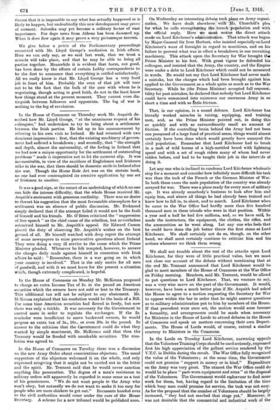In the House of Commons on Tuesday there was a
discussion on the new Army Order about conscientious objectors. The usual supporters of the objectors welcomed it on the whole, and only expressed misgiving that it might not be carried out in the letter and the spirit. Mr. Tennant said that be would never sanction anything like persecution. The degree of a man's resistance to military orders will apparently be regarded in some sense as a test of his genuineness. " We do not want people in the Army who won't obey, but naturally we do not want to make it too easy for people who are more shirkers to get out." Recusants banded over to the civil authorities would come under the care of the Home Secretary. A scheme for a new tribunal would be published soon.
On Wednesday an interesting debate took place on Army organi- zation. We have dealt elsewhere with Mr. Churchill's plea for what he calls strengthening the trench population and with the official reply. ' Here we must notioe the direct attack made on Lord Kitchener's administration. That attack was begun by Major-General Sir Ivor Herbert, who insisted especially on Lord Kitchener's want of foresight in regard to munitions, and on his failure to prevent what was in effect a breakdown in our recruiting machinery. This attack upon the Secretary for War brought tbs Prime Minister to his feet. With great vigour he defended his colleague, and insisted that the Army, the country, and the Empire were under a debt to Lord Kitchener which could not be measured in words. He would not say that Lord Kitchener had never made a mistake, but the charges which had been brought against him applied to the Government as a whole quite as much as to the War Secretary. While he (the Prime Minister) accepted full responsi. bility for past mistakes, he declared that nobody but Lord Kitchener could have summoned into existence our enormous Army in so short a time and with so title friction.


































 Previous page
Previous page